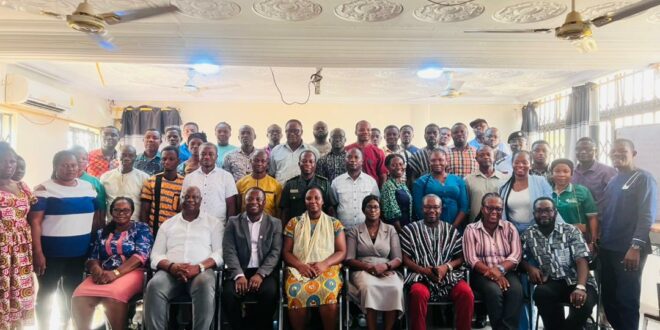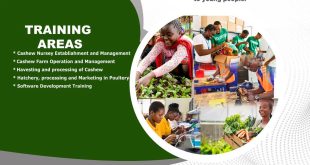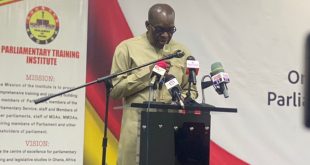The Council for Scientific and Industrial Research – Forestry Research Institute of Ghana (CSIR-FORIG) in partnership with the Forestry Commission of Ghana, on last Wednesday, February 12, 2025, organized a one-day workshop for stakeholders in the Bono East Region on Sustainable Small-Scale Woodlot Management for Bioenergy and Rural Livelihood Improvement.
Funded by the Ghana Skills Development Fund, the workshop was held at the Encom Main Hotel in Techiman and was attended by key stakeholders, including forestry and agricultural experts, teachers, environmentalists, small-scale farmers, researchers, policymakers, and players in the charcoal value chain.
The workshop aimed to equip stakeholders with the necessary knowledge and skills to efficiently manage small-scale woodlots as a sustainable source of bioenergy while enhancing rural livelihoods.
Participants were divided into three groups, each discussing proposed modules to promote small-scale woodlot management across the country. The discussion topics included:
- Nursery and hedge garden establishment and management for sustainable woodlot development
- Sustainable woodlot establishment and management for firewood and charcoal production
- Guidelines for managing and marketing wood fuel and charcoal businesses
Addressing the media after his presentation on the overview of the project, the Deputy Director of CSIR-FORIG who doubles as the Project Lead, Prof. Emmanuel Opuni-Frimpong, revealed that research had shown charcoal production to be a significant business generating substantial revenue for both producers and the government. However, woodlots are becoming increasingly scarce in Ghana, necessitating the need for sustainable small-scale woodlot management.
“Based on our research, we have found that it is becoming increasingly difficult to obtain trees for charcoal production. The transition zone between the savannah and high forest regions of Ghana is a major hub for charcoal production. We, therefore, saw the need to ensure that those who rely on charcoal as a livelihood have continuous access to trees for sustainable production to meet urban demand,” he explained.
“We developed this project idea and we got Forestry Commission to collaborate with us and the Ghana Skills Development Fund supported us to undertake extensive research with collaborators to come up with training modules so that we can train communities, farmers, individuals, schools etc. in establishing woodlots that can help sustain the raw material that is used to produce charcoal as well as also make wood fuel wood available for schools and for sustainable consumption in the country.” He stated.
Although the project was launched in Techiman, the regional capital of Bono East, Prof. Opuni-Frimpong stated that its implementation would extend to the Bono and Upper East regions. He added that CSIR-FORIG would collaborate with Municipal and District Chief Executives (MMDCEs) in the selected regions to conduct further field studies and enhance project implementation.
“Today is the launch of the project in the Bono East region which has most of our stakeholders in this project, the projects will be implemented in the Bono East region as well as the Upper East region and in the Bono region. We will collaborate with the district assemblies so that we can conduct this field study and local community interactions.” He said
Prof. Opuni-Frimpong also expressed his satisfaction with the level of engagement from participants during the workshop.
“The enthusiasm from the stakeholders in this workshop is encouraging and it is clear that they are very much interested in this project.” He said
The Bono East Regional Manager of the Forestry Commission, Mr. Dickson Sakyi, explained that the successful implementation of the Sustainable Small-Scale Woodlot Management for Bioenergy and Rural Livelihood Improvement project will help reduce the overdependence on the country’s forest reserves for charcoal production.
According to him, if stakeholders in the charcoal value chain fully embrace this initiative, it will go a long way in combating climate change while also providing a sustainable source of income and raw materials for those involved in charcoal production.
“This project will help reduce the indiscriminate cutting down of trees and reduce the reliance on our forest reverse for charcoal production. If schools, environmentalists, small-scale farmers, researchers, policymakers, and players in the charcoal value chain grow the woodlots, it will serve as both a source of income for them and a sustainable supply of raw materials for charcoal production.
“I will plead with Nananom, the Ministry of Food and Agriculture (MOFA), the Ghana National Fire Service, and all stakeholders in the charcoal value chain to fully embrace the Sustainable Small-Scale Woodlot Management for Bioenergy and Rural Livelihood Improvement project as it has the potentials not only to provide a sustainable woodlot management but also combat climate change.” He stated.
Some participants, in an interview with our reporter assured the Council for Scientific and Industrial Research – Forestry Research Institute of Ghana (CSIR-FORIG)and the Forestry Commission of Ghana of their commitment in making the Sustainable Small-Scale Woodlot Management for Bioenergy and Rural Livelihood Improvement project a success.
“From what we have observed, climate change has resulted from deforestation and forest degradation, which we are currently experiencing. This particular workshop is talking more about establishing woodlots, it’s talking more about conserving what we have, it’s talking more about people entering into tree planting to serve as a livelihood for them and by learning how to establish nurseries, transplant seedlings onto the field, and nurture trees to maturity, will will contribute directly to environmental conservation, helping to mitigate the effects of climate change.
“I think that with the climate change and its impact on our lives, no one should need to be reminded to stop indiscriminate tree felling. We need the trees, one way or the other, for cooking, for furniture, and other purposes, but we must be mindful of how we harvest them.” A participant told our reporter.
Another participant said, “I believe there are already bylaws and regulations in place to govern tree cutting. involved in charcoal production should follow the proper procedures by engaging with the Forestry Commission and adhering to the legal requirements for tree harvesting.
“Again, through this project, we must be conscious of planting and protecting trees to help address the environmental challenges we currently face.”
Source: Elvisanokyenews.com
 ElvisAnokyeNews.com Latest News, Politics, Health, Education & More
ElvisAnokyeNews.com Latest News, Politics, Health, Education & More




